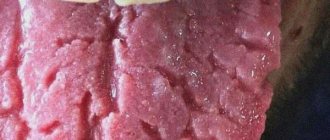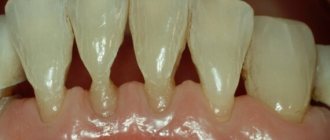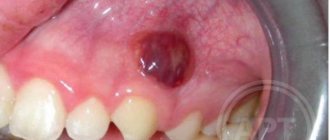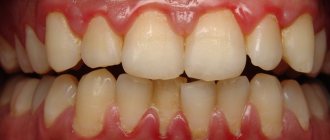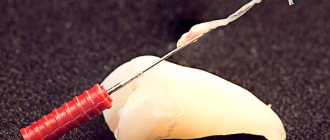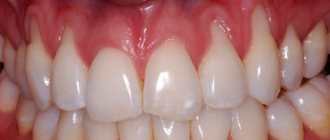Human health is a very fragile and unpredictable thing, and diseases often appear out of nowhere. This also applies to oral diseases. If you are faced with such an unpleasant problem as a sore in the mouth, then you would probably like to know how to get rid of it.
The appearance of wounds on the human oral mucosa is usually accompanied by pain and causes discomfort while eating or talking. But many people, despite these symptoms, choose not to seek help from a doctor. Some people simply ignore the problem, while others try to self-treat the disease at home. Both of these approaches give positive results only in rare cases.
The presence of any wounds and damage covering the palate indicates health problems in an adult or child. This situation should not be left to chance; you should seek help from a dentist. Only he will be able to diagnose the disease and prescribe appropriate treatment. If you are concerned about wounds in your mouth, then you can contact the LeaderStom network of dental clinics to solve this problem. We will help you cope with the situation and will make every effort to quickly cure the disease.
— 15% on the first visit
Sores in the mouth as a sign of aphthous stomatitis
Wounds in the mouth can arise as a result of the development in a person of a separate independent disease of the oral mucosa, caused by the growth and development of pathogenic microorganisms. But, in addition, the cause of such wounds may also be hidden in the general somatic condition of an adult or child.
In most cases, mouth ulcers are symptoms of a disease such as canker sores. Stomatitis is a lesion of the human oral mucosa that occurs as a result of an atypical reaction of the immune system to foreign irritants. Depending on the nature and causes of the disease, stomatitis can be of various types: ulcerative, herpetic, allergic, vesicular, etc. But people most often have to deal with the aphthous form of this disease.
Let's name the main symptoms of aphthous stomatitis:
- The appearance of round ulcers (ulcers) in a person’s mouth, which are grayish in color and surrounded by a red, inflamed rim. Ulcers are located either separately or in groups and have different sizes.
- Painful sensations in the affected areas of the upper and lower palate of a person that occur during eating, drinking, or talking.
- Deterioration of a person’s general well-being, weakness.
- Temperature increase. But this is not a mandatory symptom; it occurs in most cases in children, since they are more difficult to tolerate aphthous stomatitis in the oral cavity.
- Enlarged submandibular lymph nodes. This symptom of aphthous stomatitis also occurs more often in children than in adults.
Symptoms
If a chip occurs on a front tooth, then the patient’s first complaint is an aesthetic defect.
There may also be:
- pain of varying intensity: from slight soreness to unbearable pulsation;
- sensitivity when eating;
- violation of closure;
- trauma to surrounding tissues (tongue, lips, cheeks) due to sharp chip edges;
- tooth mobility.
The severity of symptoms directly depends on the degree of damage. The stronger the chip, the greater and more pronounced the symptoms. Minor damage does not cause much discomfort, but if a living tooth is severely chipped, the pulp may be exposed, which brings unbearable pain.
Why does aphthous stomatitis occur?
As noted above, the causes of aphthous wounds in a person’s mouth can be both local and general somatic in nature. Let's look at the main ones.
Local causes of aphthous stomatitis:
- Mechanical damage to the human oral mucosa. Such injuries occur as a result of a person eating hard and tough foods. Often, even a small scratch on the roof of the mouth can cause aphthous stomatitis.
- Thermal lesions of the human oral mucosa. The occurrence of wounds and the development of aphthous stomatitis in this case provoke burns of the mucous membrane, which a person could receive by consuming hot drinks or food.
General somatic causes of wounds in the human oral cavity:
- Heredity factors. The predisposition to the occurrence of aphthous stomatitis in the mouth may be determined by genetic reasons. Therefore, there is a risk of developing this disease and the manifestation of a chronic form of stomatitis (when ulcers on the mucous membrane appear regularly) in people whose parents also suffered from this disease.
- Somatic diseases. Aphthous stomatitis often develops in people who suffer from any secondary somatic diseases. For example, these could be diseases of the digestive system and gastrointestinal tract.
- Weak immunity. For this reason, children are susceptible to oral ulcers because their immunity is not yet fully developed. In a child, aphthous stomatitis is more severe than in an adult and is accompanied by an increase in temperature and a deterioration in general well-being. Against the background of colds, immunity is also often reduced, and aphthous stomatitis occurs in the person’s mouth.
- Avitaminosis. With an incorrect diet, a person does not receive enough substances necessary for the successful functioning of the body. Due to a lack of vitamins C and B or microelements such as selenium, folic acid, zinc or iron, in some cases aphthous stomatitis occurs in a person’s mouth.
- Allergy. An allergic reaction associated with eating foods such as citrus fruits, nuts (especially peanuts), chocolate, red berries (strawberries, wild strawberries) or foods containing gluten (cereals, pasta) in some cases leads to the appearance of canker sores. wound in a person's mouth.
- Stress. When a person finds himself in a stressful situation, he spends significant resources to cope with the current problem. This leads to a loss of strength, decreased immunity and a general weakening of the body, as a result of which wounds form in the person’s mouth and he develops aphthous stomatitis.
Consequences
The consequences of a broken tooth are not only unpleasant, but also dangerous to health:
- if an incisor breaks, this affects the appearance and clarity of speech;
- a decrease in the chewing surface can cause insufficient grinding of food and, as a result, digestive problems;
- the defect becomes a favorable place for the growth of bacteria, which leads to caries, inflammation and suppuration of the gums;
- if a tooth breaks off and scratches the mucous membrane or tongue, this also provokes the development of infection.
How to get rid of sores in the mouth?
Stomatitis wounds that occur in the human mouth, in most cases, heal on their own within 7-10 days after formation. But timely treatment of aphthous stomatitis is necessary in order to prevent the formation of ulcers on the human oral mucosa again. The fact is that the acute form of stomatitis, which is characterized by the sudden appearance of wounds of various sizes on the upper and lower palate in a person’s mouth, if the problem is ignored or the wrong treatment is carried out, tends to develop into a chronic form of the disease. Wounds in the oral cavity with chronic stomatitis appear periodically and bother a person from time to time throughout life.
To exclude the possibility of aphthous stomatitis ulcers reoccurring, dentists perform the following treatment:
Local therapy
. It involves treating wounds on the oral mucosa with antiseptic agents: gels, ointments or sprays. During this treatment of stomatitis, a person is prescribed daily rinses with solutions such as furatsilin, chlorhexidine, miramistin, etc.
General therapy.
It includes a set of measures to cure this disease and at the same time strengthen the body. To strengthen the body, the doctor prescribes immunomodulatory drugs and vitamin courses to the person. To combat aphthous stomatitis, different drugs are used, depending on the nature of the disease and the causes of its occurrence: antihistamines, antivirals, steroids or antibiotics.
The selection of funds for the treatment of wounds with aphthous stomatitis is carried out only by a doctor and occurs after a visual examination of the person’s oral cavity, conducting the necessary diagnostic tests and making a diagnosis. The LeaderStom Clinic offers to use the services of our experienced doctors to carry out these operations.
Traditional treatment
If a lump is found in a child, it is not recommended to resort to using any folk remedies on your own, as they can negatively affect the baby’s condition.
For adults, rinsing with antibacterial compounds is perfect. They will help prevent the development of inflammation in the injured area of the mucosa, and will also help maintain the cleanliness of the oral cavity. An important addition: you can use traditional methods only if there are no allergic reactions to herbs. Otherwise, it is better to refuse alternative treatment. The most effective recipes are described below:
- Salt rinse. To do this, dissolve a teaspoon of sea salt in a glass of warm water. Rinse your mouth after eating; after treatment, you should stop eating for at least an hour.
- Chamomile decoction. It is most convenient to use ready-made filter bags, which are sold at the pharmacy. You need to fill one such packet with a glass of boiling water, let it brew and use it to treat the oral cavity.
- Calendula. For this rinse you will need an alcohol solution. Twenty drops of tincture are dissolved in a glass of warm water and used after any meal, preferably before going to bed.
- Propolis. This beekeeping product has excellent antiseptic and healing properties . It is used in the amount of one teaspoon per glass of warm water.
The above recipes are not only effective, but also affordable, and if used regularly, they will help to avoid infection of the oral cavity.
What can be done to prevent sores in the mouth from appearing again?
Completing a course of timely treatment for aphthous stomatitis will reduce the risk of a similar disease of the human oral mucosa in the future, but in some cases it will not completely eliminate this possibility. This especially applies to situations where a person has a hereditary tendency to develop aphthous sores in the mouth, suffers from autoimmune diseases, and is prone to allergies.
In such cases, preventive measures are required:
- Enhanced oral hygiene. It involves not only daily brushing of a person’s teeth and gums twice a day, but also rinsing the oral mucosa with solutions of antiseptics or medicinal herbs in order to prevent stomatitis.
- Balanced diet. Reviewing the diet and diet will help saturate the human body with essential vitamins and microelements and reduce the risk of allergies that can cause aphthous wounds in the human mouth.
- Taking vitamin complexes. If it is not possible to compensate for the lack of nutrients in the body with nutrition, then to prevent stomatitis a person can regularly take vitamin complexes, the composition of which, doses and duration of administration will be determined by your attending physician, based on the results of the tests.
- Taking immunomodulatory drugs. Today, there are many remedies that stimulate the immune system and encourage the body to resist diseases. They can be either of plant origin or synthesized in the laboratory. The selection of such drugs is individual for each person and is carried out by a doctor.
- Compliance with preventive measures, timely treatment of the disease and following the recommendations of the attending physician will help a person avoid relapses of aphthous stomatitis and the reappearance of wounds in the mouth in the future. Be attentive to yourself and your health, listen to the signals that your body gives, and at the first signs of disease in the oral mucosa, seek help from a dentist.
You should not self-medicate stomatitis and use the advice of friends or information found on the Internet, since the exact cause of sores in the mouth and stomatitis can only be identified through diagnostic methods. And the selection of treatment is determined in accordance with the diagnosis, and in each case it is individual. Dentistry "LeaderStom" offers its assistance in the treatment of aphthous stomatitis and other diseases of the oral mucosa. Contact us and we will help you identify the cause of the disease and select medications accordingly.
We will quickly and efficiently deal with chipped teeth
At our clinic, doctors are ready to quickly treat chipped teeth and any other injuries or damage. We use advanced techniques - from remineralization to installation of onlays and implantation.
We offer our clients affordable prices and are always ready to answer any questions they may have. We will relieve you of pain, restore the aesthetics of your smile and the ability to chew normally. We have affordable prices and special offers.
To learn more about the treatment process and make an appointment with a dentist at a convenient time, leave a request on the website or call us at the numbers provided.
Traumatic stomatitis of the oral cavity - the result of soft tissue injury
Any injury can sooner or later lead to serious delayed consequences. And although getting an injury to the oral cavity is more difficult than hitting a limb, damage to the teeth, gums, cheeks and tongue is not uncommon. The consequence of injury can be various diseases; in this article we will look at one of the options - traumatic stomatitis. From the article you will learn what the causes and symptoms of this disease are, as well as how it can be diagnosed and treated.
Complicating factors
The extraction procedure itself is ordinary and highly predictable, given the level of modern dentistry and the technological equipment of clinics. Nevertheless, even such manipulation has complications, especially if you take it lightly. It is worth taking into account that each clinical case is individual: if in one case tooth extraction is not very difficult, then in another the dental surgeon has to apply all his skills and use advanced technologies and equipment in treatment. It is no coincidence that the price lists of clinics include the item “Complicated tooth extraction”: you have to pay more for this service. Experts identify several factors that can lead to complications, including fragments in the socket.
- Wisdom teeth.
Because of their remoteness, default eights are quite difficult to remove. They often grow incorrectly or do not fully erupt, which increases the risk of complications during removal. - Retention.
A tooth that has not fully erupted, when only part of the crown is visible above the gum or is completely hidden in the soft tissues. - Dystopia.
The tooth erupts at the wrong degree and abuts its neighbors. - The tooth is severely damaged due to trauma.
In such a situation, when removed, it may crumble, and some of the fragments will remain in the hole.
Professional help
Professional help with cracks and chips in teeth involves their restoration. The method of restoring a tooth depends on how badly it is damaged. There is usually no indication for extraction in this situation, unless there has been sufficiently serious damage affecting the roots of the tooth. Tooth restoration can be carried out in several ways:
- Veneering or lumineering. This method is acceptable for restoring canines and incisors. Veneers are special overlays that are fixed to the natural tooth after it has been prepared (ground down). Their thickness can be compared to false nails. Veneers can be direct or indirect. In the case of a chip, the first option is considered more successful, since it involves applying the composite material directly to the damaged area right in the dental office. Indirect veneering takes longer because microprostheses are made individually in a dental laboratory. Lumineers are the same as veneers, but thinner and made of expensive materials. Their cost is correspondingly higher.
- Installing tabs. This restoration option is relevant for damaged chewing teeth, if a significant part of them is destroyed. The inlays are made from impressions taken from the jaw and are fixed with a special adhesive material.
- Installation of crowns. This restoration method is also suitable for molars and premolars. It is used if the crown part of the tooth is completely or almost completely destroyed.
- Filling and grinding. This is the simplest technique for restoring a chipped area of a tooth, which is used for minor damage. Most often used on chewing teeth and premolars, but sometimes they are a good solution for restoring front teeth.
In case of damage to the pulp chamber, tooth depulpation is carried out in order to protect its tissues from infection. For chips that occur due to caries, full comprehensive treatment is carried out. If you have a chipped or cracked tooth, we recommend that you do not hesitate to contact a specialist. First of all, because in some cases it poses certain threats to your health. We are waiting for you at Dr. Granov's dental clinic for an in-person appointment!
Causes of chafing
The cause of tongue rubbing can be not only a broken tooth, but also other factors:
Poorly placed filling. Low-qualified specialists in inexpensive clinics sometimes treat their work with negligence. As a result, the placed filling has uneven edges. All excess material slowly begins to cause discomfort in the mucous membrane of the tongue. Sometimes this rubbing reaches the muscle organs.
Uncomfortable dentures. Some people wear dentures, but they can sometimes be uncomfortable. At the initial stage of wearing, a complex orthopedic design can injure the entire oral area. Inconvenience is caused by a poorly polished surface, large prosthetic elements and locking joints.
An uncomfortable denture can hurt your gums and tongue.
Content
Tooth decay is an unpleasant event that requires immediate response. This can happen due to injury, untreated caries, brittle teeth and other reasons. Any chips, even small ones, mean a violation of the integrity of the enamel. That is, the tooth becomes vulnerable, infection can enter and the destruction of the crown part can continue. The patient begins to feel discomfort and pain when exposed to hot and cold temperatures, sweet and sour. The sharp edge of the chip injures the soft tissue of the gums during chewing, and bacteria penetrating into the wound cause inflammation. To restore your tooth and avoid negative consequences, you should immediately make an appointment with a specialist.



